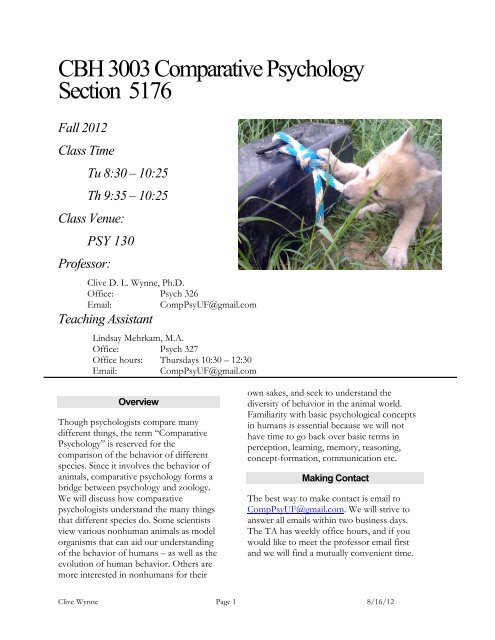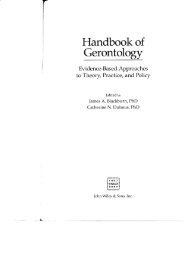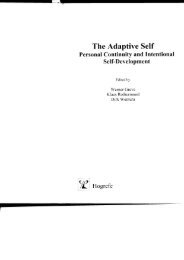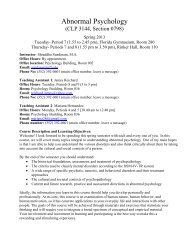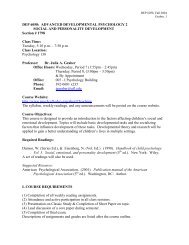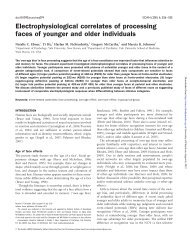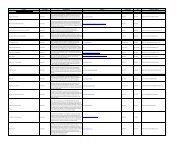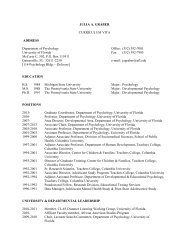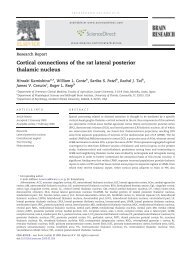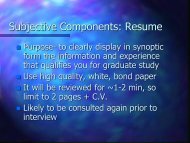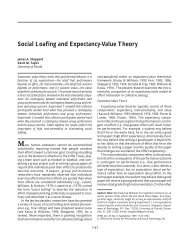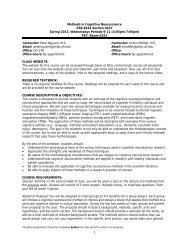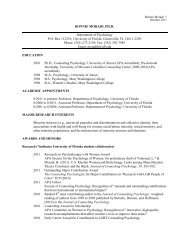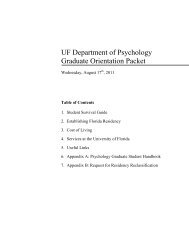CBH 3003 Comparative Psychology Section 5176
CBH 3003 Comparative Psychology Section 5176
CBH 3003 Comparative Psychology Section 5176
You also want an ePaper? Increase the reach of your titles
YUMPU automatically turns print PDFs into web optimized ePapers that Google loves.
<strong>CBH</strong> <strong>3003</strong> <strong>Comparative</strong> <strong>Psychology</strong><br />
<strong>Section</strong> <strong>5176</strong><br />
Fall 2012<br />
Class Time<br />
Tu 8:30 – 10:25<br />
Th 9:35 – 10:25<br />
Class Venue:<br />
PSY 130<br />
Professor:<br />
Clive D. L. Wynne, Ph.D.<br />
Office: Psych 326<br />
Email: CompPsyUF@gmail.com<br />
Teaching Assistant<br />
Lindsay Mehrkam, M.A.<br />
Office: Psych 327<br />
Office hours: Thursdays 10:30 – 12:30<br />
Email: CompPsyUF@gmail.com<br />
Overview<br />
Though psychologists compare many<br />
different things, the term “<strong>Comparative</strong><br />
<strong>Psychology</strong>” is reserved for the<br />
comparison of the behavior of different<br />
species. Since it involves the behavior of<br />
animals, comparative psychology forms a<br />
bridge between psychology and zoology.<br />
We will discuss how comparative<br />
psychologists understand the many things<br />
that different species do. Some scientists<br />
view various nonhuman animals as model<br />
organisms that can aid our understanding<br />
of the behavior of humans – as well as the<br />
evolution of human behavior. Others are<br />
more interested in nonhumans for their<br />
own sakes, and seek to understand the<br />
diversity of behavior in the animal world.<br />
Familiarity with basic psychological concepts<br />
in humans is essential because we will not<br />
have time to go back over basic terms in<br />
perception, learning, memory, reasoning,<br />
concept-formation, communication etc.<br />
Making Contact<br />
The best way to make contact is email to<br />
CompPsyUF@gmail.com. We will strive to<br />
answer all emails within two business days.<br />
The TA has weekly office hours, and if you<br />
would like to meet the professor email first<br />
and we will find a mutually convenient time.<br />
Clive Wynne Page 1 8/16/12
<strong>3003</strong>Syllabus.doc<br />
Students with Special Needs<br />
If you have a documented disability please<br />
make contact as soon as possible.<br />
Texts<br />
Wynne, C.D.L. (2001) Animal Cognition:<br />
The mental lives of animals. Palgrave:<br />
Basingstoke, England.<br />
The draft chapters of a revised edition of<br />
the text will be available on Sakai.<br />
Requirements<br />
There will be no cumulative final exam.<br />
You are required to:<br />
1). Attend every class prepared to<br />
discuss the reading.<br />
2). Attempt all four in-class tests.<br />
Please note that in order to receive a<br />
passing grade you must complete all the<br />
course requirements. A student may<br />
receive a grade of E for failing to<br />
complete all requirements, even if his or<br />
her total points on completed<br />
requirements might otherwise appear<br />
adequate for a higher grade in the grading<br />
table below.<br />
Examinable material<br />
All material in the textbook, additional<br />
readings, and presented in class, is subject<br />
to examination in the four non-cumulative<br />
tests.<br />
Attendance<br />
If you are unable to attend class for a<br />
reason beyond your control 1 please make<br />
1 It is ‘beyond your control’ if you are sick, have an<br />
accident, or a member of your family is taken<br />
seriously ill and you have to rush home. It is not<br />
‘beyond your control’ if you oversleep, forget, or just<br />
have something more attractive to do.<br />
Students representing the university in sporting or<br />
cultural events may also request permission to miss a<br />
class if the event clashes with a regular class date.<br />
Permission is usually granted to students who 1) make<br />
contact as soon as possible so we can make an<br />
appointment to see the documentary evidence<br />
for your incapacity. If appropriate, we will<br />
then arrange a special test for you.<br />
Generally we shall have lectures in the<br />
Tuesday session and discussion on Thursdays.<br />
Grading<br />
Your grade is determined by your total<br />
percentage score.<br />
Minimum % Grade<br />
95 A<br />
90 A-<br />
87 B+<br />
83 B<br />
80 B-<br />
77 C+<br />
73 C<br />
70 C-<br />
67 D+<br />
63 D<br />
60 D-<br />
0 E (Fail)<br />
The good news is – these grades are firm –<br />
there is no curve. Everybody in the class can<br />
get an A grade (and I hope you do).<br />
The bad news is – these grades are firm –<br />
there is no curve. If you score just one point<br />
below the cutoff then you will get the lower<br />
grade.<br />
Honor Code<br />
I have never had any problem with cheating in<br />
this class, but it is important that you<br />
understand that I am not willing to give a<br />
passing grade to any student who does not<br />
abide by the UF honor code. Any student who<br />
cheats or helps another student cheat will<br />
receive an E (Fail) in this class.<br />
a request at least seven days before the date and 2) are in<br />
good standing in the class and 3) have an accompanying<br />
letter from the event’s coach or director on appropriate<br />
letterhead. Email is not sufficient.<br />
Clive Wynne Page 2 8/16/12
<strong>3003</strong>Syllabus.doc<br />
Tuesday <br />
date <br />
Thurs Aug <br />
23 <br />
COURSE SCHEDULE <br />
Tuesday Thursday Old New <br />
text text <br />
-‐-‐ Introduction 1 1 <br />
Aug 28 Introduction Power of the adaptive<br />
1 1 <br />
approach<br />
Sep 4 Perception Anthropomorphism 4 2 <br />
Sep 11 Concept formation Course Review 5 3 <br />
Sep 18 Time & Number Exam 1 5 4 <br />
Sep 25 Cause & Effect Nature vs Nurture in dog 3 5 <br />
cognition<br />
Oct 2 Reasoning Course Review 7 6 <br />
Oct 9 Navigation Exam 2 5 7 <br />
Oct 16 Social learning Fairness 2 8 <br />
Oct 23 Social cognition Course Review 2 9 <br />
Oct 30 Remembering Exam 3 6 10 <br />
Nov 6 Communication Ape language 8 11 <br />
Nov 13 Language Monkey Fairness 8 12 <br />
Nov 20 TBA Thanksgiving – no class<br />
Nov 27 Conclusions & Comparisons Course Review 9 13 <br />
Dec 4 Exam 4 No class<br />
In addition to the listed textbook chapters, other readings will be made available in Sakai.<br />
Clive Wynne Page 3 8/16/12


